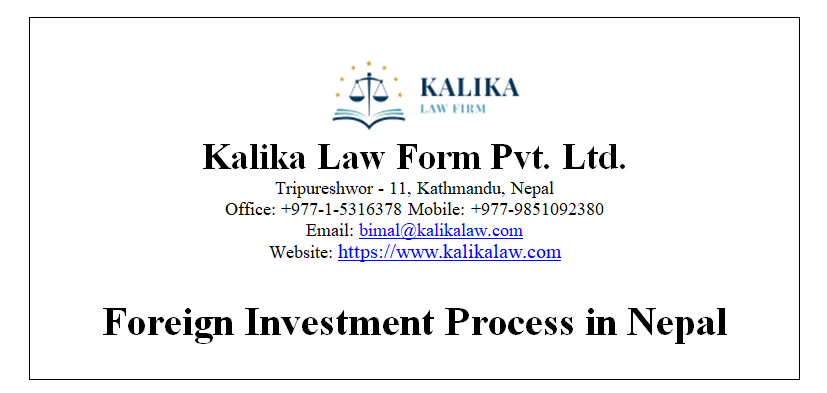Nepalese Foreign Investment Process

In Nepal, foreign investors can invest in just 5 ways.
1. Foreign investment approval for new industry establishment,
2. Share transfer to foreign investors in Nepalese own industry,
3. Approval of foreign debt investment,
4. Re-investment approval,
5. Foreign investor’s technology handover contract acceptance
According to the current Company Act, 2063, any foreign company established or used for such purposes in Nepal has conducted any business on a regular basis for a period of one month or more from the office or location used for such purpose or has appointed any person for regular contact or engaged the services of such company in Nepal.
To operate the Liaison Office as per the recently prevalent Company Act, 2063, permission needs to be taken from the Registrar of Companies to operate the Liaison Office. Only 5 lakhs to Rs 10 lakhs can be invested. Liaison office operations can be carried out even without the investment. There should be a public contact person.
According to the recently prevalent Companies Act, 2063, before obtaining the approval for the office from the Registrar of Companies, only the approval for operating the branch office should be obtained from the concerned body. The branch offices operated only with the approval of the Registrar of Companies will not be able to get the same facilities as in the industry.
Foreign investors in Nepal have to deposit security deposit for foreign investment
1. Rs 20,000. (twenty thousand) must be kept as a bond.
Foreign investors in Nepal can return the bond amount for foreign investment:
1. The business amount should be mentioned in the certificate of business operation or the tax payment certificate taken from the relevant tax office.
The amount can be taken outside Nepal in foreign currency:
1. Proceeds from the sale of shares,
2. Amount of dividend received for investment in Nepal,
3. Amount of foreign debt or interest due
4. Amounts received by foreign investors under technology transfer agreements,
The investment amount, dividend amount, loan amount or interest amount, and the amount received by the foreign investor under the technology transfer agreement can be taken back out of Nepal only after the foreign investor submits the proof of investment from abroad or from the home country to the Central Bank of Nepal and records or accounts it.
The procedure for operating a foreign manufacturing industry is as follows:
1. Foreign investment approval
2. Company registration
3. Local body registration
4. Internal Revenue Office Registration
5. Industry registration in the Industries Department, IEE as per requirement or E.I.A.
6. Company bank account operations,
7. Money has to be transferred from India to Nepal through a banking channel.
8. Nepal Rastra Bank accounting approval for money transferred to Nepalese Bank,
9. Company share price records,
10. Trademark registration
As per the prevailing law after approval of foreign investment in Nepal, after completing the process from steps 1 to 7, you will be able to transfer money from your Home Country to Nepal. The investment amount can be transferred from your or your wife’s bank account. The amount to be transferred will have to be transferred for the purpose of foreign investment. The amount transferred for remit purposes or personal purposes will not be recorded or accounted as a foreign investment by the Central Bank.
Necessary provisions for industries and companies operating in foreign markets related to the prevailing Nepali laws:
1. According to the prevalent law, the economic year in Nepal ends on the 1st day of Shrawan (August).
2. While paying income tax, you will have to pay by the end of Ashwin (October) month annually. In case the audit report is not ready, the filing date can be extended through the Internal Revenue Office up until the end of Poush (December).
3. According to the prevailing law, the industry or company will have to pay the amount of VAT to the Internal Revenue Office online on a monthly basis within the 25th day of the following month.
4. According to the prevalent Company Act, every year at the end of Poush, the documents like audit report, AGM, etc. of the company have to be submitted online to the Company Registrar’s office to keep the company records updated.
5. According to the prevailing law, the company and the industry will have to give information as soon as possible if there is any capital manipulation, shareholders change, or change of registered office.
6. According to the prevailing law, companies and industries can import and use raw materials, machinery, furniture, and other means of transportation in small quantities for business use. According to the code mentioned in the Economic Ordinance, a 15 percent customs tax will be levied.
7. According to the prevailing law, companies and industries can import, use, or sell raw materials. Raw materials can be imported, sold, and distributed at some additional price. The 13 percent tax refund adjustment from the Nepal Government will be available. In which VAT will have to be paid equal to the additional amount on the purchased price.
8. It does not appear that there is a legal system in place for foreign companies, to import or purchase raw materials from other foreign companies by operating a branch office or liaison office and sell and distribute raw materials to other companies or industries in Nepal.
9. Foreign-owned companies and industries can avail of all the facilities similar to Nepali companies and industries.
10. A foreign-funded company can take loans from Nepali banks and financial institutions to operate the industry.
11. There is no legal system for trading business in foreign investment.
12. Businesses such as hotels, hospitals, manufacturing or construction businesses, manufacturing industries including cement production, international cargo business, casino, hydropower, etc. can be operated as foreign investment.
13. Businesses such as hotels, hospitals, manufacturing or construction business, manufacturing industries including cement production, international cargo business, casino, hydropower, etc. can be operated by foreign investment in which a foreign investor or a foreign company as a holding company can also invest.
14. A single objective will remain in the case of foreign-invested industries.
15. Companies and industries have to pay an income tax of 25 percent on profits and an additional 5 percent tax on profit disposal as per prevailing Nepalese law. Companies and industries run by Nepali or foreign investors have the same legal system.
16. It takes at least 20 to 30 working days for the foreign investment company to operate the industry.
17. In order to import raw materials from abroad and sell them to the Nepali industry or to prepare or pack finished goods after changing at least 20 percent of the raw materials, the industry should be operating in Nepal. Operated on domestic or foreign investment.
18. Investors in foreign-invested industries and companies can obtain business visas. An investor or a contact person cannot obtain a business visa on the basis of the Company Registrar’s approval of the branch office or liaison office.
19. According to the agreement between the two countries, there is no need to pay double tax on the income earned in Nepal after taking it abroad (India) or bringing the income earned in India to Nepal. Can be used directly as income.
20. Nepalese investors and foreign investors can jointly open industries and companies. But foreign investors have to invest at least 2 crore rupees.
21. Any industry, insurance, bank, and financial institution related to communication, Nepali investors should have invested up to 20% of any amount.
22. Following Laws are attracted on the Foreign Investment process – Foreign Investment and Technology Transfer Act 2075, Company Act, 2063, Industrial Business Act, 2076, Industrial Business Act, 2078, Customs Act, 2064, Labor Act, 2064, Labor Act – Bonus Act, 2030, Public Procurement Act, 2063, Income Tax Act, 2058, Excise Act, 2058, Patent, Design and Trademark Act, 2022, Immigration Act, 2049.
Please contact us for further consultation.

recent news items

Documents Required for Registration of a Foreign Company, Branch Office, or Liaison Office

Additional Documents Required for a Joint Venture or Wholly Foreign-Owned Company

Documents Required for Foreign Investment in an Existing Business in Nepal

Documents Required for Foreign Investment in Nepal

Documents required for the purchase and sale of company shares in Nepal

Documents Required for Company Registration in Nepal

Nepalese Foreign Investment Process

सर्वाेच्च अदालतले अब देखि अन्तरिम आदेश जारि भयका मुद्दालाई प्राथमिकता दिएर सुनुवाइ गर्ने ।
